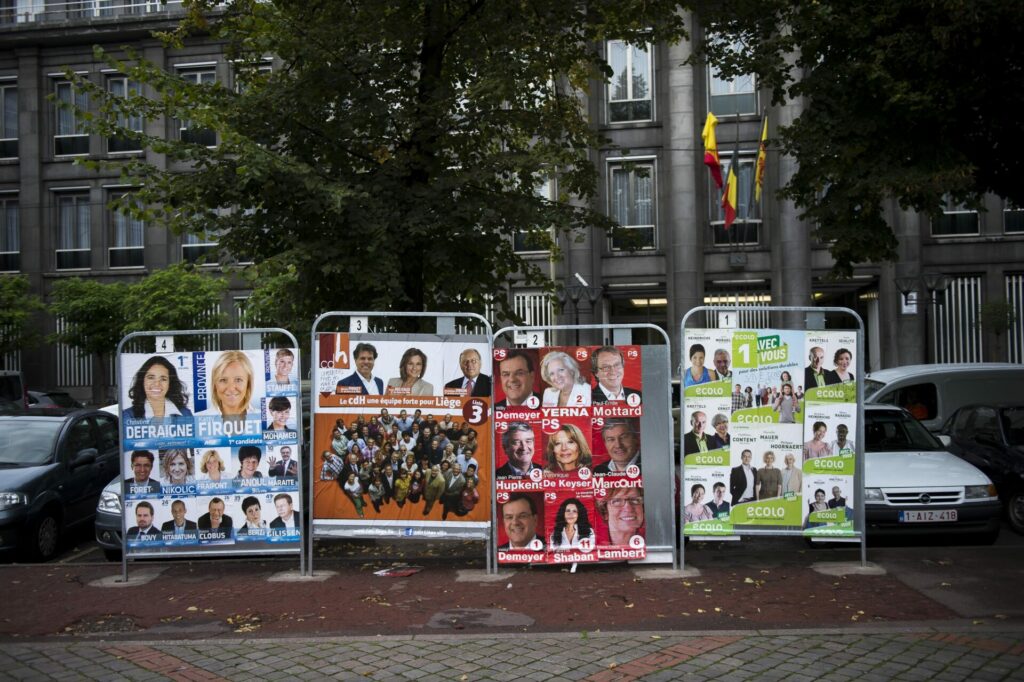Belgium's politics is famously complicated, and people can often no longer see the forest for the trees. Therefore, The Brussels Times will provide an overview of the different political parties, how they are linked, who they represent and what they stand for.
As with most things in Belgium, language plays an important role in the country's political party systems: the deep decentralisation and linguistic divide have led to a fractured political landscape. Citizens in Belgium can only vote for politicians and parties on their own side of the language border.
In practice, this means that someone living in Flanders cannot vote for a Walloon party or politician, not even in the federal elections – a system that has been denounced by many and was considered an important reason for Belgium's record-breaking 652-day long period without a Federal Government. The Chamber of Representatives currently has a grand total of 12 parties represented by sitting MPs.
Three traditional parties
Until the mid-20th century, politics in Belgium was dominated by three unitary parties: the liberals, the Christian democrats and the social democrats. However, Flemish nationalist parties started gaining traction in the north of the country, and between 1969 and 1978, these three traditional parties all split into French-speaking and Flemish branches – which still exist today.
Despite this linguistic split, the sister parties are still closely linked. They are often seen as two sides of the same coin, even if certain political positions do not always fully overlap. Some parties have even found common ground despite being two separate parties speaking different languages. Towards the end of the 1970s, two green parties arose separately in both parts of the country, but they have always worked closely together.
Socialists / Social Democrats
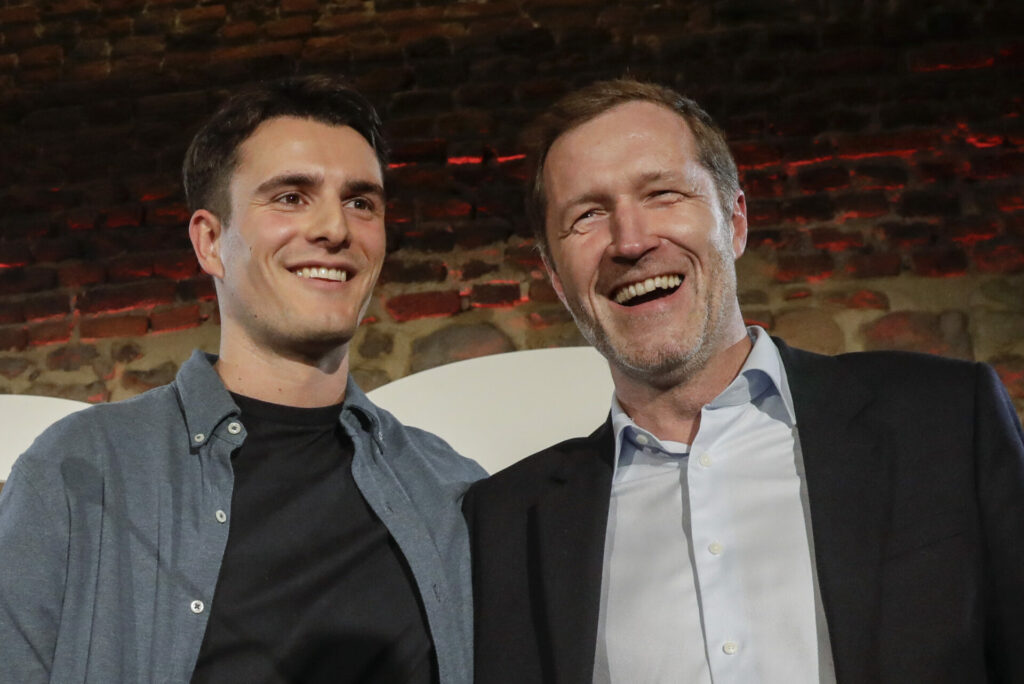
Vooruit leader Conner Rousseau (left) and PS leader Paul Magnette. Credit: Belga/Thierry Roge
Vooruit
Vooruit ('Forward' in Dutch) is considered a Flemish centre-left social-democratic political party in Belgium. It was known as the Flemish Socialist Party (sp.a) until March 2021, when its current name was adopted. Vooruit no longer calls itself a party, but a "socialist movement."
While Vooruit still positions itself as socio-economic leftist, it has moved towards the centre on the socio-cultural axis since it is being led by Conner Rousseau in 2019. Due to that shift, it competes with Vlaams Belang, which is distinctly rightwing on socio-cultural issues but has moved towards the centre on socio-economic issues.
Vooruit's campaign is based on five pillars: solidarity, justice, equality, freedom and sustainability. The party strongly advocates "doing your part and getting your share," meaning that those who are wealthier should contribute more than those who are less so. The movement also states that it "does not matter what origin you have, what you look like, or what your gender is," everyone should get the same rights: the right to a pension, social protection, the right to healthcare and education, but also a job with good pay.
While the socialist movement also states that diversity "is an asset in our society," and "everyone should respect each other," Rousseau sparked controversy in April this year for stating in an interview that he "does not feel like he is in Belgium" in the Brussels municipality of Molenbeek.
Additionally, the government must invest in a decisive climate policy and impose rules on the fossil fuel industry, which must be done in a socially just manner. "Only if everyone is on board can we save the climate."
Parti Socialiste – PS
The Socialist Party ('Parti Socialiste' in French and commonly shortened to PS) is the leading left-wing force in Belgium and serves as the counterpart to Vooruit for French-speaking voters. The party is often placed on the centre-left of the country's political spectrum, as the self-anointed social democrats' ideology seems to be based on increased state intervention.
To that end, they have developed their platform on four axis: eco-socialism, fiscal justice, public health, and education – with an accompanying measure for each. This includes increased taxing of multinational companies and the "ultra-rich," rendering public transport free for all to accelerate the ecological transition away from cars, and the decriminalisation of cannabis.
PS is the most represented left-wing party both in parliament and in government: a total of four federal ministers and state secretaries belong to the party, and they also hold the largest number of seats in the Brussels and Walloon Parliaments. As a result, both regional governments are headed by PS Minister-Presidents, with Rudi Vervoort in the Capital Region and former Prime Minister Elio Di Rupo in Wallonia.
The current party leader is Paul Magnette, the former Walloon Minister-President.
Liberals
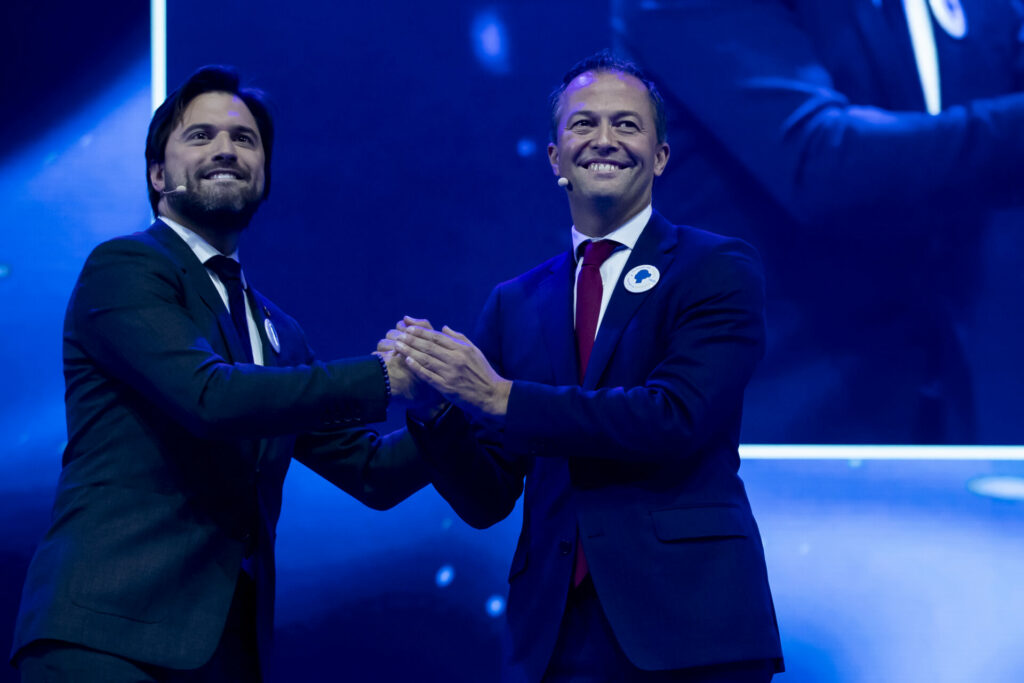
MR leader Georges-Louis Bouchez (left) and Open Vld leader Egbert Lachaert. Credit: Belga/Kristof Van Accom
Open VLD
The Open Flemish Liberals and Democrats ('Open Vlaamse Liberalen en Democraten' in Dutch, usually called Open VLD) is a Flemish conservative-liberal political party, created in 1992. Since the late 1990s, the Flemish liberals have pursued a liberal centrist course with both progressive and classical accents.
Ideologically, Open VLD started as an economically liberal and somewhat libertarian party, but rapidly became more centrist and gave up much of its free market approach. Still, the party continued to contain conservative-libertarian and classical liberal wings.
For Open VLD, freedom is the basic value: a person may choose as freely as possible in their life, as freedom ensures progress. By giving people as much space as possible, they will make a better society – without over-regulating or "patronising" measures from the government.
The liberals believe that the Belgian economy and market should also be free, while citizens and businesses should be taxed as little as possible to stimulate the economy. This also puts the responsibility of seizing all opportunities available on the individual, with as little intervention from the government as possible.
The party programme also includes the fight against exclusion and discrimination as liberty, freedom and equality are key to the liberals: freedom of speech, gender equality and the separation of church and state are high on the list.
Belgium's current Prime Minister, Alexander De Croo, is a member of the Open VLD party. The party leader is Egbert Lachaert.
Mouvement Réformateur – MR
The Reformist Movement (referred to as MR, the acronym for 'Mouvement réformateur') is the leading liberal party for centre-right and right-wing voters in Wallonia and Brussels. The party got its name exactly 20 years ago, after spending eight years as a disjointed coalition of centre-right parties on the French-speaking political spectrum, before becoming the Francophone flag-bearer for the ultra free market economy model.
In recent years, the party has increasingly shifted to the right, as they have called for a more liberal approach to be taken on public welfare, which has been accompanied by a more conservative position on security and social issues as a whole.
This shift can be attributed to the 2019 election of Georges-Louis Bouchez as party president. His tenure has been met with controversy, not only within his own party but also within the Federal Government. Many have grown frustrated with his critical comments towards the government's decisions, actions and policies – despite the fact that his party is part of it – and his general belligerent style of politics.
However, this has not stopped him from spearheading the party's 2030 platform, which aims to "modernise" the country within ten years by reforming public finances and reducing taxes for the middle class, as well as limiting unemployment benefits to achieve an employment rate of 80%.
Among the notable figures in MR's history are Didier Reynders, who led the party from 2004 and 2011 and is the current European Commissioner for Justice, as well Charles Michel, the current President of the European Council and former Belgian Prime Minister (2014-2019).
Greens
Groen
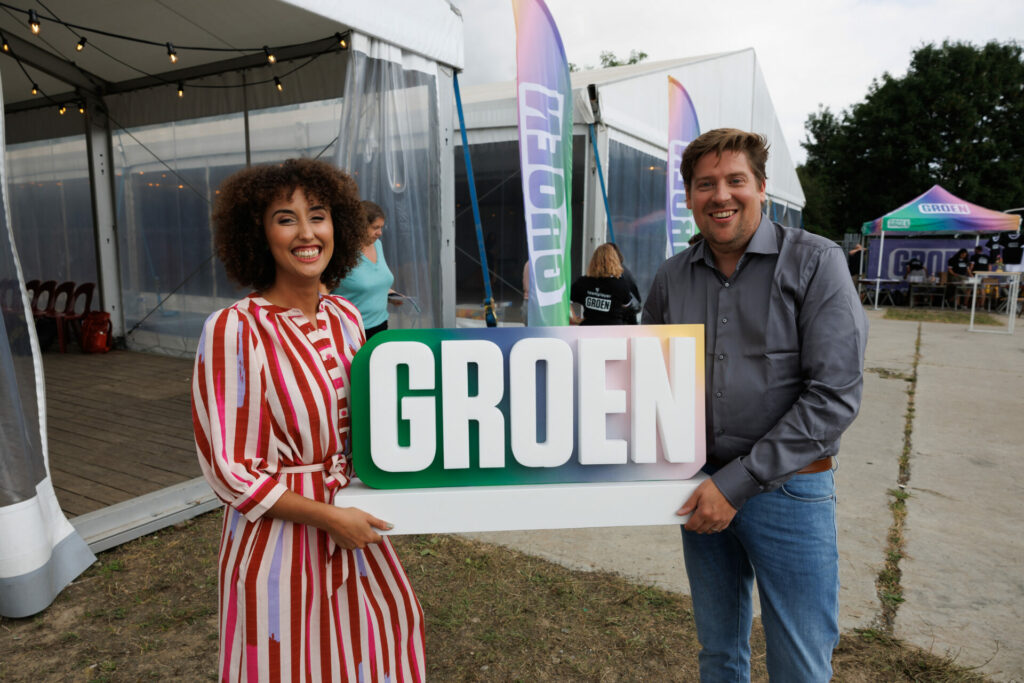
Groen co-chairs Nadia Naji and Jeremie Vaneeckhout. Credit: Belga/Kurt Desplenter
Groen ('Green' in Dutch) is a Flemish green and progressive, leftist political party based on three core values: ecology, peace and social justice. In its early years, the party specifically sought to overcome traditional cleavages (liberal-socialist, Catholic-secular and Flemish-Belgian).
Since the 1980s the ideals of diversity and social justice have also taken a prominent role. In its current political programme, Groen connected these three values by the concept of "quality of life," which it calls the "green thread" through its programme. The party website states that green stands for sustainability, with a need for renewable energy for a better climate to improve the quality of life for humans and animals alike with clean air, pure water and fertile soil.
One of the party's big achievements in the coalition agreement was Belgium's nuclear exit by 2025. However, due to the soaring energy prices and Russia's invasion of Ukraine, the Federal Government agreed to keep its nuclear reactors open for ten years longer than initially planned, until 2035 – something that was considered a major political loss for the greens.
As a leftist party, Groen puts equal opportunities and fairness first, including in taxes: big companies and the big polluters should contribute more than small entrepreneurs and employees.
Additionally, the government and economy should be committed to the people and their needs, meaning that everyone – regardless of age, socio-economic status, religion, ethnic-cultural background, sexuality or gender – has the right to affordable housing, healthcare and childcare, as well as the right education and a decent income.
The current co-chairs of the party are Nadia Naji and Jeremie Vaneeckhout.
Ecolo
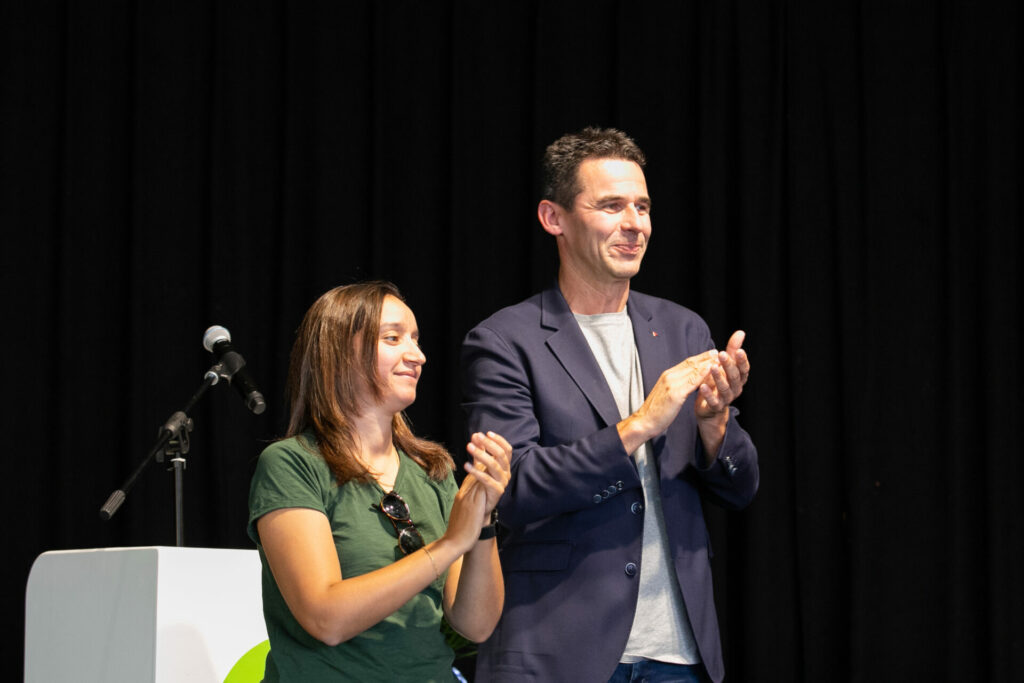
Ecolo co-chairs Rajae Maouane (left) and Jean-Marc Nollet. Credit: Belga/Anthony Malagoli
As the go-to green party for French-speaking voters, Ecolo's mission statement is to transform Belgium into a "more open, democratic, and sustainable" society. When the party was founded in 1980, it wanted to leave its reputation as an activist organisation behind and rapidly demonstrate that it was eager to go into power and implement its environmentally-friendly policies.
However, Ecolo had to wait until 1999 to enter the Federal Government, where it remained until 2003. After that, the party's top brasses chose to focus on growing their political influence in Brussels by benefiting from the capital's voters' increased concerns over climate change.
As a result, several of Brussels' 19 municipalities are now run by Ecolo mayors, with the green wave continuing into the 2019 elections, where the party was now the second-largest in the Brussels Parliament and the second party on the left with the most MPs in the Federal Parliament. Currently, the party has two ministers in the Brussels regional government, and two ministers and a state secretary in the Federal one.
Looking ahead to the 2024 elections, the party's platform aims to combine social and climate justice by implementing measures such as reducing Belgian greenhouse gas emissions by 55% within 10 years, all while launching an inter-federal action plan against racism, intolerance and all forms of discrimination.
Rajae Maouane and Jean-Marc Nollet are the current co-presidents of the party.
Christian-democrats
CD&V
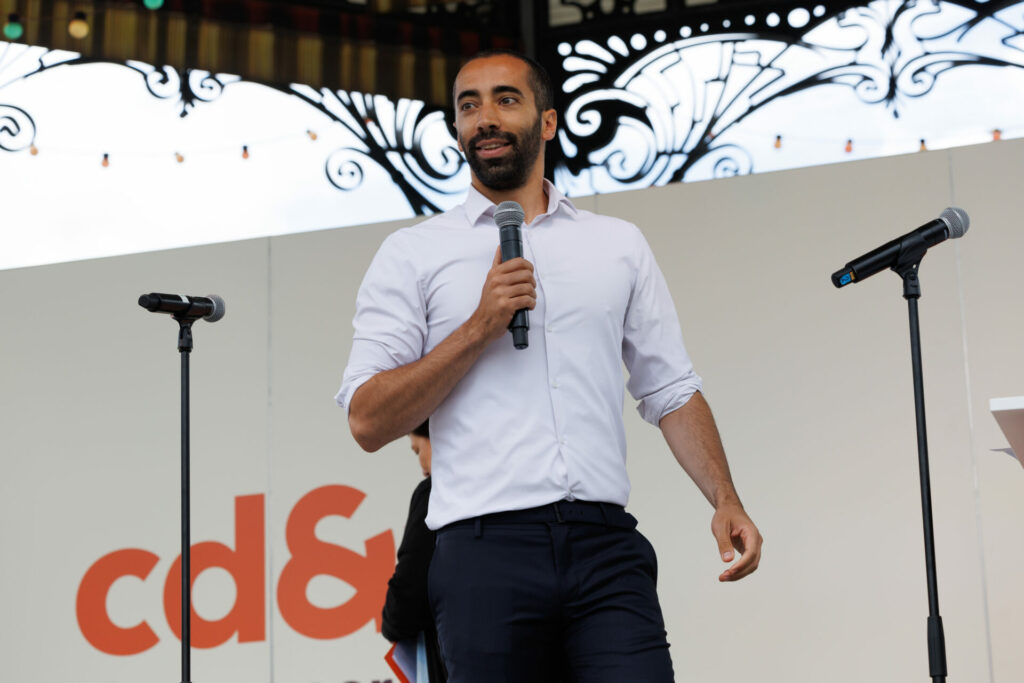
CD&V chair Sammy Mahdi. Credit: Belga/Kurt Desplenter
Christian Democratic and Flemish ('Christen-Democratisch en Vlaams' in Dutch, usually just called CD&V) is a Flemish Christian-democratic political party. It was traditionally the largest political party of Flanders, until it was overtaken by the N-VA in the 2010s.
The current CD&V presents itself as a party "of and for the people," and puts forward three important themes: a decent income, a healthy life and a safe home. CD&V emphasises the "unique and irreplaceable value" of every human being.
However, under the current asylum policy of State Secretary for Asylum and Migration Nicole de Moor (a member of CD&V), hundreds of people are being left to sleep on the streets as the government flounders with the current reception crisis, despite warning calls from over a year ago.
The current generation of Christian Democrats strongly opposes the increased individualisation in post-industrial society and advocates a "warm, respectful society," in which family is seen as a cornerstone of society.
The current chair of the party is Sammy Mahdi.
Les Engagés
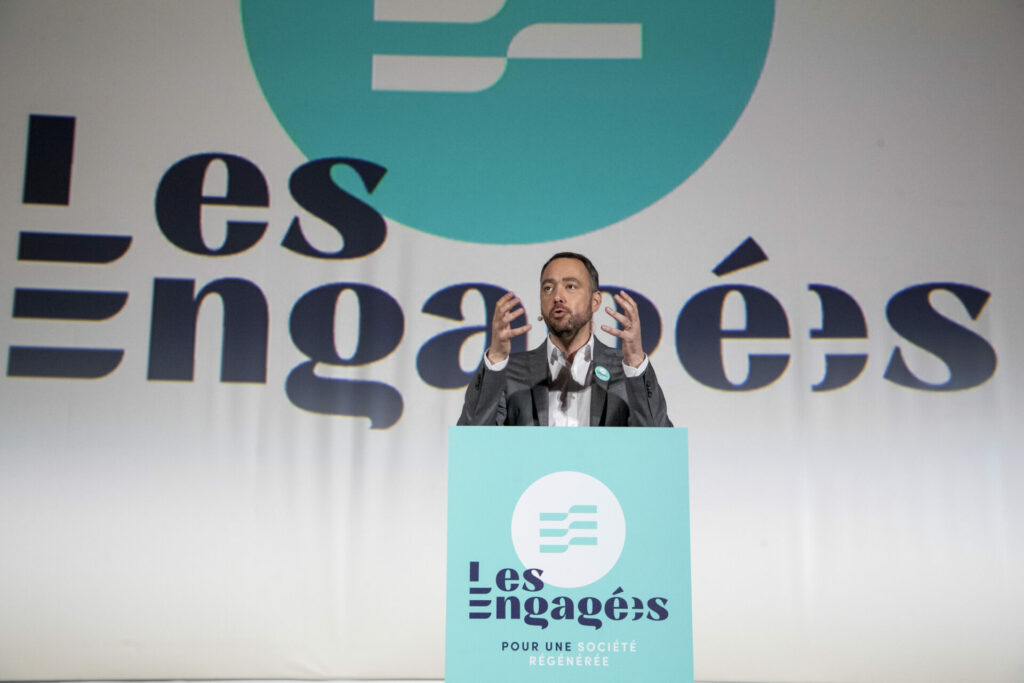
Les Engages' chairman Maxime Prevot. Credit: Belga/Nicolas Maeterlinck
The Engaged ('Les Engagés' in French) has historically been the CD&V's French-speaking equivalent but has spent the last two decades moving away from its Christian-democratic roots in order to position itself as a centrist force in Wallonia and Brussels, despite dwindling returns.
Between 1968 and the early 1990s, the Parti social-chrétien (Christian Social Party) was one of the most influential political players in Belgium, acting as a base for the country's Christian and conservative electorate.
However, a string of scandals throughout the 1990s brought about a great deal of soul-searching within the party, which later changed its name to Centre démocrate humaniste (cdH) in 2002 – abandoning the theological overtones in favour of a more 'humanist' approach, such as its left-wing attitudes on immigration, for example.
Still, the party's turn to the centre has not resulted in electoral success, as its performance fell strongly in the 2000s and they have not been part of the Federal Government since 2014. The party then rethought its identity again and changed its name to 'Les Engagés' in March this year, seemingly wanting to mark itself as the main centrist party for French-speaking voters.
The party's current president is Maxime Prévot.
Radical left parties
PTB-PVDA
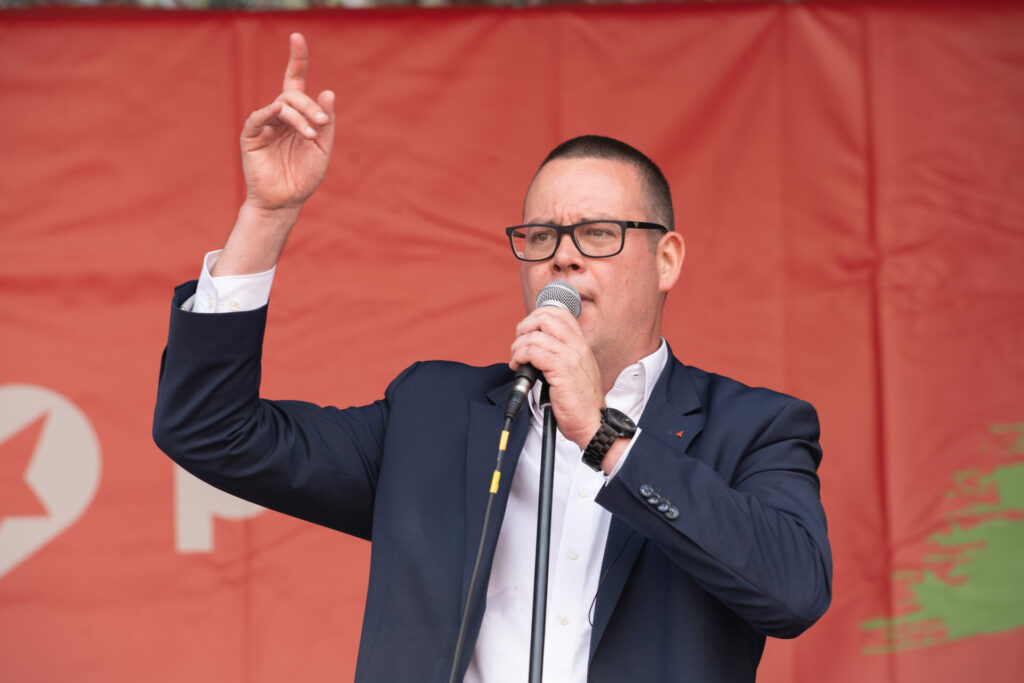
PVDA/PTB chair Raoul Hedebouw. Credit: Belga/Noe Zimmer
The Workers' Party of Belgium ('Parti du Travail de Belgique' in French and 'Partij van de Arbeid van België' in Dutch, usually called PTB-PVDA) is a Marxist and socialist political party. It is one of the few Belgian parties that is a fully national party, representing both Flanders and Wallonia.
Having traditionally been a small party, the PTB-PVDA has gained momentum since the 2010s, continuously scoring better at the polls and elections, particularly in Wallonia and working-class communities in Brussels. According to its programme, the party sees itself as a "contemporary communist party" but strives for "socialism 2.0." PTB-PVDA is the leftmost party with national representation in Belgium and is often described as radically left.
Key points from the party program include a minimum pension of €1,500 net, extra resources for the healthcare sector, a wealth tax for the very rich and a social climate policy.
The current chair is Raoul Hedebouw.
Nationalist parties
New Flemish Alliance (N-VA)
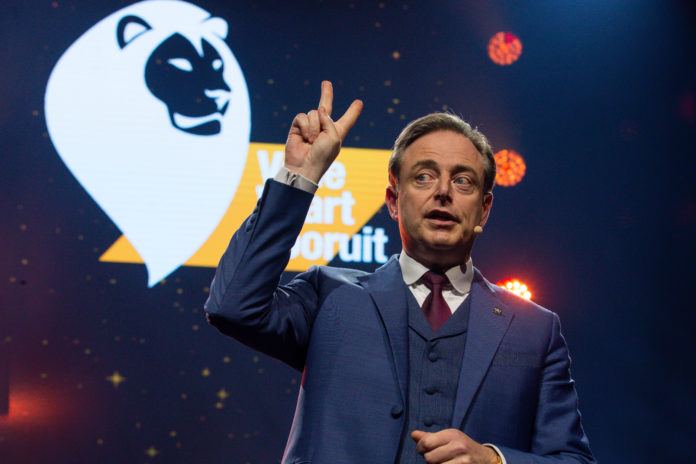
N-VA chair Bart De Wever. Credit: Belga
The New Flemish Alliance ('Nieuw-Vlaamse Alliantie' in Dutch, usually simply called N-VA) is a Flemish nationalist and conservative political party, founded in 2001. In recent years, it has become the largest party of Flanders as well as of Belgium as a whole.
Despite receiving the most votes in the 2019 elections, the N-VA is excluded from the current Federal Government coalition due to tensions with other parties, and therefore often harsh in its criticism of many government decisions. The Flemish Government, however, is led by Minister-President Jan Jambon, who is an N-VA member.
Like Vlaams Belang, N-VA is a regionalist and separatist movement that strives for Flemish independence – with Brussels as its capital. However, while Vlaams Belang is calling for a unilateral declaration of Flemish sovereignty, N-VA favours a "peaceful and gradual secession from Belgium."
Initially established as a centre-right party, N-VA has moved to the right and has adopted a distinctly conservative identity under the leadership of Bart De Wever. It is also known for its insistence on the exclusive use of Dutch (Flanders' sole official language) in dealings with government agencies, and for the promotion of the use of Dutch in Flanders.
Additionally, the party advocates free-market economics and immediate tax reductions to stimulate the economy, but its main campaign points revolve around safety and security: a stronger police force, harsh on crime, more resources against radicalisation, as well as stricter immigration policies.
While the party previously advocated deepening ties with the EU, it has since shifted to a more "Eurosceptic" stance, and has sat with the European Conservatives and Reformists (ECR) parliamentary group in the European Parliament since 2014.
Vlaams Belang
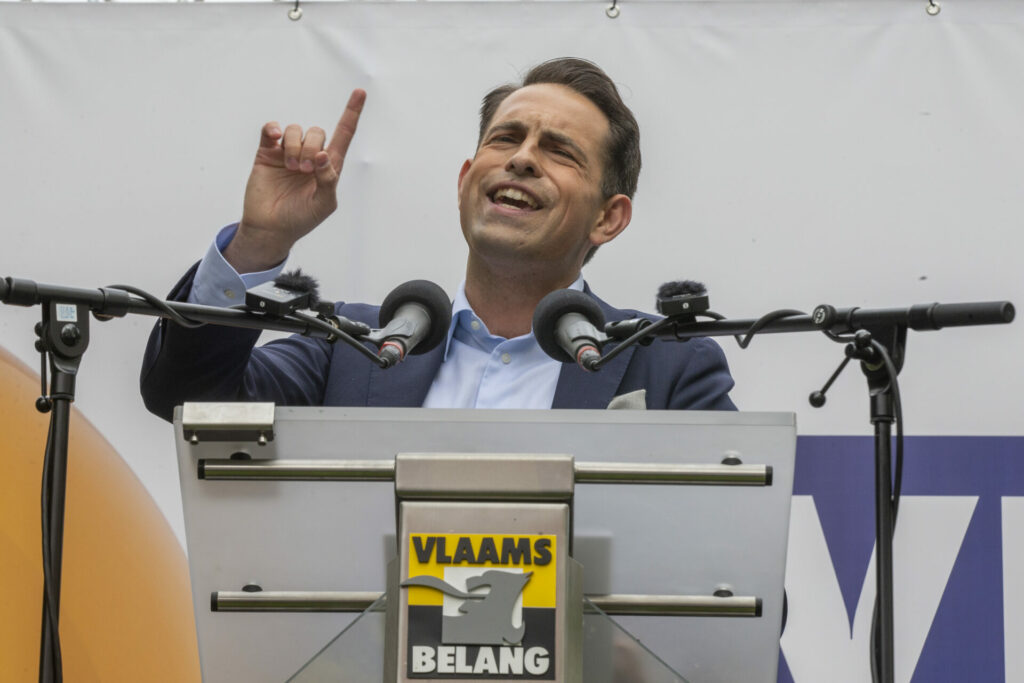
Vlaams Belang chair Tom Van Grieken. Credit: Belga/Nicolas Maeterlinck
Vlaams Belang is a far-right party that strives for an independent Flanders and believes that Belgium as a country should cease to exist. The party is most commonly known for its extremist views, including opposition to immigration on racial terms, the defence of what it likes to define as "Christian norms and values," and its opposition to the advance of what it calls "political Islam and Muslim fundamentalism" in Europe.
Following its anti-immigrant push, the party won 18.5% of the votes during Belgium's federal elections in 2019 – jumping up 12.6% from its last election results in 2014 – despite the cordon sanitaire in place to keep them out of the government.
This cordon sanitaire was imposed against the party (then still named Vlaams Blok) in 1989, which allowed all other political parties to sign a formal agreement not to form a coalition or any kind of political agreement with the far-right party – effectively blocking Vlaams Blok from entering any level of government, citing its racist rhetoric.
In 2004, after it was convicted of breaching the anti-racism law, the party rebranded itself as Vlaams Belang. After the name change, no written agreement on a cordon sanitaire against the party was made, but the approach by the other parties remained the same – meaning it is currently still excluded from any type of government formation.
Following the elections in 2019, Belgium's other political parties excluded both separatist parties (Vlaams Belang and N-VA) from their formation discussions, which is part of the reason it took so long for Belgium to form its Federal Government, which now consists of a whopping seven-party coalition ranging from greens to conservatives.
The party's current leader is Tom Van Grieken.
DéFI
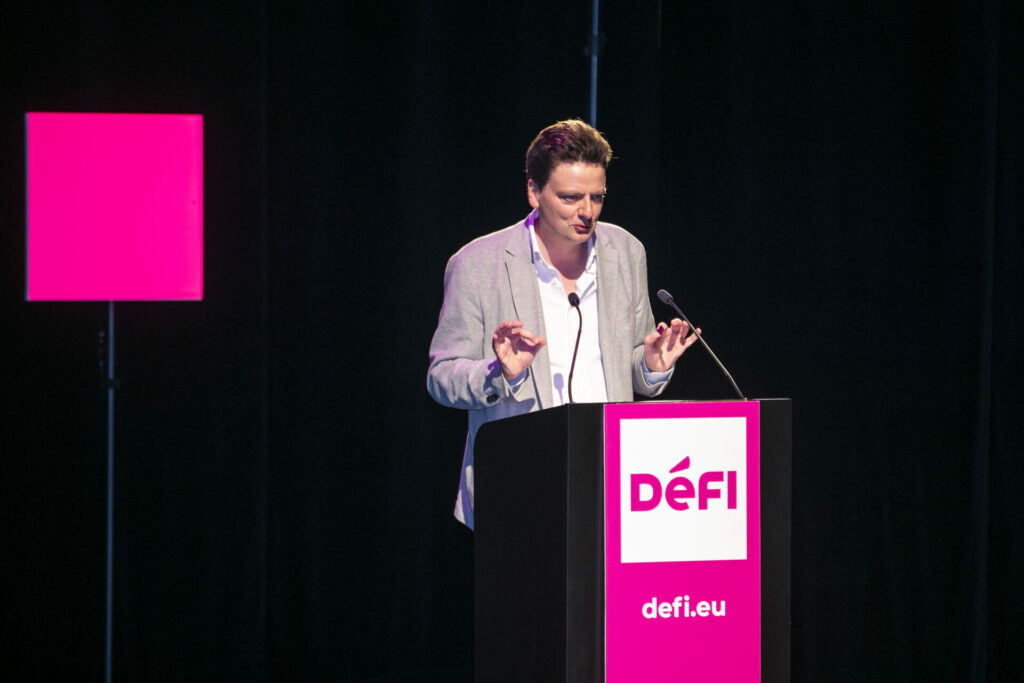
DeFi chair Francois De Smet. Credit: Belga/Hatim Kaghat
Independent Democratic Federalist (abbreviated to 'DéFI,' the French translation of 'challenge') is a centrist party base in Brussels, whose primary goal was to safeguard the rights of French-speakers in the Capital Region and the bordering municipalities.
The party was founded in 1964 as the 'Front démocratique des francophones' (FDF) by a group of Walloon activists who were opposed to Belgium's then-recent establishment of linguistic boundaries, which they thought would heavily impact French-speakers in the capital.
Due to its position as a 'big tent' party with no established ideology on economic and social matters, the FDF became a prominent force for federalism in the capital throughout the following decades, when it progressively found itself at the head of various municipalities. The party also grew closer to the French-speaking liberal party to the extent that it played a part in the latter's transition to becoming the MR.
However, it left the MR in 2011, due to disagreements on further linguistic issues in the municipalities around Brussels. As a result, the party changed its name to DéFI in 2015, and has attempted to define itself as a leading centrist force by offering a blend of liberal economics and progressive social policies, all while putting secularism at the centre of its programme.
The party is currently led by the Federal MP François De Smet.
Related News
- Belgian politics for dummies: Who is in power where?
- Why Belgium has six governments (and not seven)
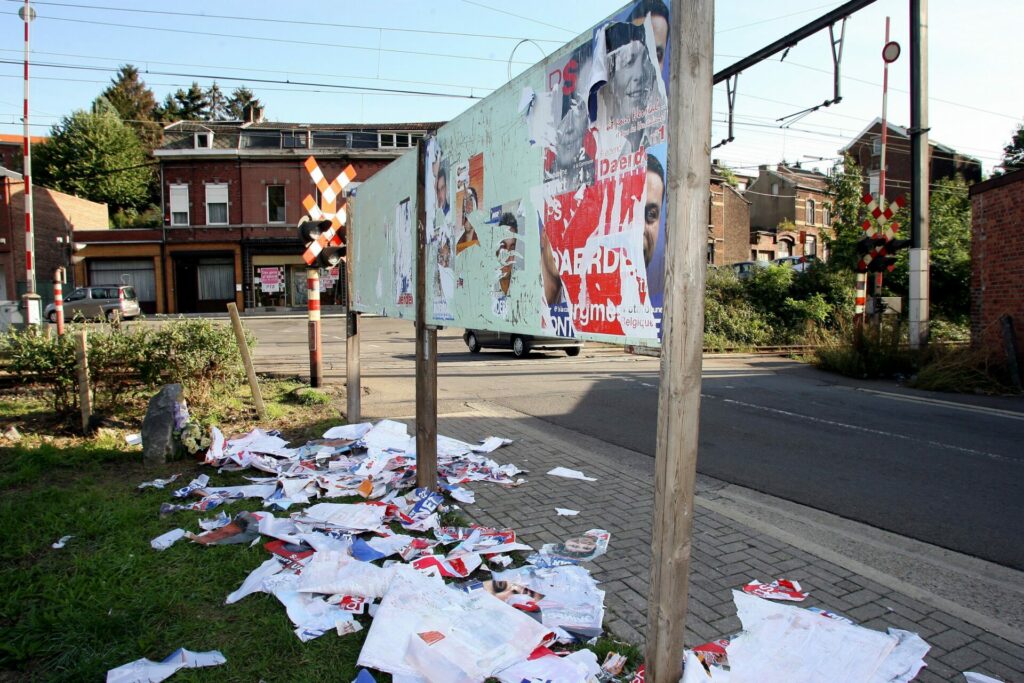
We hope our guide to Belgium's political parties has not left you feeling like this! Credit: Belga / MIchel Krawkoski

